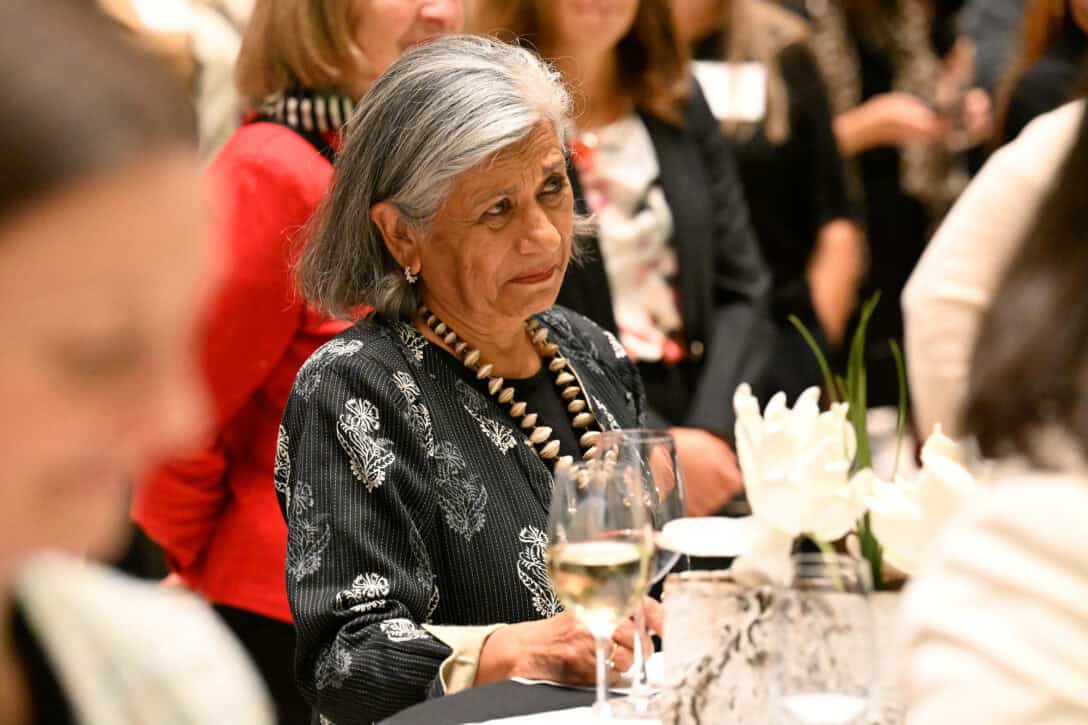In conversation with Philanthropist Journal writers Tim Harper and Aiden Cyr, Omidvar discusses her legacy in the upper chamber, a lifetime of advocating for the underdog, and passing the baton to new champions of the non-profit sector.
To find the essence of Ratna Omidvar, one should merely look at whom she chose to thank the day she took formal leave from the Senate. The senator rose in her place to offer praise for those who toiled out of the spotlight – the pages, those who transcribe and publish Hansard, the tech support workers, the parliamentary protective service, the bus drivers, and the interpreters – in short, the unappreciated.
If that was a career capper, it was pitch perfect for a woman who has made it her life’s work to advocate for those who often have no voice: immigrants, refugees, and those weighed down by poverty. Throughout her career, Omidvar embodied a steadfast commitment to the non-profit sector by dedicating her indefatigable drive to wherever she was most needed.
Whether boldly challenging rushed legislation or immersing herself in the meticulous due diligence of committee work, she helped ensure that the voices of the routinely overlooked and undervalued were reflected in Canada’s laws.
But let’s not rush to the final tributes too quickly. Omidvar may have retired from the Senate at age 75, but she has made it clear her country will continue to hear from her.
Omidvar may have retired from the Senate at age 75, but she has made it clear her country will continue to hear from her.
Earlier this year, Omidvar spoke candidly with The Philanthropist Journal, sharing her journey from newcomer to Canada to outspoken advocate for the charitable sector on Parliament Hill. Two distinct but complementary voices joined the senator in a conversation: veteran journalist Tim Harper, who has focused on Canada’s political landscape and the sector’s evolving role within it, and emerging sector leader and Indigenous writing fellow Aiden Cyr. Together they explored what the sector can learn from the senator’s core achievements, the core obstacles that remain, and her advice for the next generation of sector leaders confronting the complex challenges that lie ahead.
Reflecting on her own journey, Omidvar emphasized that the strength of Canada’s charitable sector lies in its capacity for renewal and reinvention. The sector’s core challenges remain constant: delivering data-driven services, securing sustainable finances, and planning for HR succession, but she believes the solutions must evolve. She doesn’t believe that sector leaders are always properly informed and equipped to make the right decisions. Training in governance should be available to the next generation of leaders, she says, and the governance leaders must reflect their communities. When she led the Maytree Foundation, Omidvar says, it committed to ensuring that the people who sat around the board table in the city looked like the people who lived in the city. A new wave of leaders should be able to champion the sector’s response to its “common needs” like embracing emerging technologies or innovative governance and finance models, she says.
Our global charities have both more influence and greater challenges following the election of Donald Trump, she says. While the Canadian sector cannot fill the US void, Omidvar argues that it does provide an opportunity for our charities to lead. To do so, however, the sector must be taken seriously at home. That means securing respect from government in the form of stable funding and a dedicated body in government that can operate alongside the sector as a partner. Governments rely on charities to deliver services, she says, but that reliance needs to be accompanied by respect. “The sector does not get this respect,” she says, in the form of reciprocal arrangements, a home in government, or reliable financing.
Yet, for Omidvar there exists a moment for the sector to distinguish itself from past ways of operating. Its resilience will lie in its ability to achieve results and advocate for the respect we deserve.
The story of Omidvar’s rise to prominence in a country she knew virtually nothing about before seeking sanctuary here is itself a tale of rebirth and resilience. Born in India, she met her Iranian-born husband, Mehran, while studying in Germany. They embarked on a hike in the Bavarian mountains one day not really knowing each other well, Omidvar says, and came down the hill declaring they would hike together forever. They have been together 50 years.
I could no more change my name than I could change the colour of my skin, so I wore them both with pride.
Ratna Omidvar
Omidvar moved to Iran with her life partner, but the couple had to flee the revolution, and they found refuge in Canada in 1981, a country of logging camps populated by lumberjacks, beavers, bears, and the RCMP, at least according to her only base of knowledge, her grade school geography teachings in India. She arrived in Canada as a German-language instructor with a young daughter. Work did not come easily, and in fact, she says, she was told almost upon arrival that because of the colour of her skin and her name, she would not find a job. She considered changing her name and spent two days practising three choices – Rosa, Runa, Rita – “but I could no more change my name than I could change the colour of my skin, so I wore them both with pride.”
She says two life decisions – to remain authentic and daring to reinvent herself – fuelled her success for nearly 45 years in this country and eventually set her on the path to leadership. The authenticity proved easier than the reinvention, but the seeds of a long career in philanthropy were planted at her daughter’s daycare, where she volunteered to lead a fundraising effort to purchase new strollers. The goal was set at $800, but Omidvar surpassed it and experienced a sense of empowerment she had not yet felt in her new home.
From there, her commitment to volunteering and supporting community grew. She parlayed her newly acquired fundraising power into a job at Toronto’s St. Stephen’s Community House, an organization that helped newcomers settle into their new home. As a newcomer herself, Omidvar has never wavered in her commitment to those who struggle to gain a toehold in a strange land. She went on to become president of the Maytree Foundation; founded, with the late David Pecaut, the Toronto Region Immigrant Employment Council; and continues to sit on a number of boards, including the Samara Centre for Democracy and the Century Initiative. She was called to the Senate in April 2016, an appointment by former prime minister Justin Trudeau, but Omidvar sat as an independent. On the day of her departure in October 2024, she called herself “an accidental Canadian and an accidental senator. I did not aspire to be either, but a confluence of accidents – some good, some bad – led me here.”
When she arrived in the Senate chamber, it surprised her that it felt so colonial. She remembers the mace, bowing to the monarch, swearing an oath to the Queen; “that kind of felt out-of-body for me.’’
“I did not appreciate the colonial trappings of our Parliament, but I did appreciate in time fully the fact that every piece of legislation is studied carefully and debated and passed only when due diligence has been given to them by the House of Commons and the Senate in the interest of Canadians,” she says. “There was this yin and yang I experienced.”
She chaired the social affairs committee and studied national dental care and pharmacare, school food programs, and changes to the wording of “O Canada.” She has been part of a Senate that has become more independent and more focused on its role, a chamber of men and women providing “the last port of call” for the protection of minority rights in this country. She leaves a legacy befitting an activist.
She sparked a change to Canadian anti-terror legislation that had unintentionally prevented humanitarian aid from reaching Afghanistan after the Taliban took control, because it had been designated a terrorist entity. Unchallenged, this would have shut out philanthropic efforts to protect women’s rights in Afghanistan, where organizations such as the Red Cross and World Vision could not move charitable dollars to the country. Based on recommendations of the committee chaired by Omidvar, Parliament did pass legislation providing an exemption from terror laws for humanitarian life-saving work, but it took a frustrating length of time. The United States, the United Kingdom, the European Union, and Australia had provided carve-outs on terrorism legislation for philanthropic organizations months after the Taliban took power in 2022. The Canadian legislation did not pass until June 2024.
She is also responsible for amendments to the Income Tax Act that eliminated the “colonial” language compelling charities to exercise direction and control over donees, replacing it with an amendment allowing charities to grant to non-qualified donees. The legislation she introduced in the Senate was ultimately adopted by the House of Commons. In addition, she led bipartisan efforts to unfreeze Russian assets seized by Canada and redirect them to victims of the war in Ukraine, an initiative that now calls for renewed leadership and support from the newly elected 45th Parliament.
Omidvar also championed an amendment to the Citizenship Act – accepted by Parliament – providing a new mechanism of appeal for anyone whose citizenship has been revoked as a result of fraud or misrepresentation. Her work advocating for temporary foreign workers was unfinished when she retired, she says.
I carried [civil society leaders’] ideas in this chamber with, I hope, some success.
Ratna Omidvar
These efforts, she emphasizes, were inspired by the leaders of civil society. “I carried your ideas in this chamber with, I hope, some success,” she said in her farewell address.
Fellow senator Mary Coyle of Nova Scotia said Omidvar brought her own life experience as a refugee and displaced person to the chamber. “As a citizen of the world, she has brought the plight of oppressed Iran and Afghanistan women, the exploitation of international students in Canada, has represented temporary foreign workers, and made sure those diverse voices of those not often heard are listened to here in this chamber,” Coyle said.
She also won tributes from across the aisle, where Yonah Martin, the opposition leader in the Senate, lauded Omidvar’s non-partisan efforts, telling the Senate the two had worked together to benefit Canadians.

There are others in the Senate who come from the charitable sector who will take up the cause in her absence, Omidvar says. She points to two Ontario senators, Paulette Senior and Farah Mohamed. Senior came to the Senate after decades working on gender equity and diversity issues, as president and CEO of the Canadian Women’s Foundation and as CEO of YWCA Canada. Mohamed, appointed in March, is the CEO of The King’s Trust Canada, former CEO of the Malala Fund, and the founder of G(irls)20, which seeks to create a new generation of female leaders.
“The sector needs a voice,” Omidvar says, not simply to propose legislation, but to safeguard its interests. On that front, she points to her opposition to a recent Senate fisheries committee report that recommended revoking the charitable status of organizations advocating against the East Coast seal hunt.
Going forward, Omidvar says, Canadians and the charitable sector must forge their own path, distinct from the US pull. That means resisting pressures to reduce foreign aid; roll back progress on diversity, equity, and inclusion; and fall short of efforts to forge true reconciliation with Indigenous Peoples. The sector, she argues, has a huge role to play in demonstrating resilience and resolve, and in proving, time and again, that Canada is not the United States.
Politics is the lifeblood of a country . . . If I could redo my life as a Canadian, I would have joined a political party at a younger age.
Ratna Omidvar
She urges young people she speaks to at universities to join a political party, become part of a local riding association, or campaign for a city councillor, because “politics is the lifeblood of a country . . . If I could redo my life as a Canadian, I would have joined a political party at a younger age.” Indeed, it was just a week before we spoke that she joined the Liberal Party, as an engaged Canadian in the midst of our most recent election campaign.
She is also taking stock of her adopted country, a new home she did not always fully understand. “We are not perfect and we will never be, but we do have the courage to look in the mirror and be honest at the reflection that stares back at us,” she says. It may not be pretty, and Canada doesn’t always get things right, but it tries, and it has the fortitude to look back at its faults, she says, whether it is the colonization of Indigenous Peoples, the legal discrimination against Japanese and Chinese immigrants, or the institutionalized racism against Black people in Canada. This country continues to search for truth, justice, and reconciliation. “For that reason, I am most proud to be a Canadian.’’
In the short term, a fellowship will take Omidvar back to Germany for some months, but she will continue to be an active voice in the Canadian debate, whether she has a Senate pulpit or not.
“My country will continue to hear from me, one way or another,” she says.

